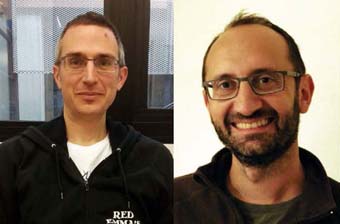
Two powerful research lines strengthen at Universitat de València thanks to the new economic aid of the European Research Council (ERC), which has just granted economic grants, worth more than 3,5 million euros, to researchers Alejandro Gaita Ariño (ICMol) and Gustau Camps Valls (LPI). These are the Consolidator Grant scholarships, destined to consolidate new groups of research on the border of knowledge.
The European Research Council, under the authority of Marco Horizonte 2020 programme, has just granted two economic grants of 1,7 and 1,9 million euro each to projects which took place at the Institute for Molecular Science (ICMol) and at the Image Processing Laboratory (IPL) of Universitat de València. Magnetic molecules with quantum potential and new data processing methods for remote sensing are the research topics of the selected scientists in order to receive the Consolidator Grant scholarships. These are some of the most prestigious and best-provided of the “Horizonte 2020” European framework programme for research. With that, Alejandro Gaita Ariño and Gustau Camps Valls will take off as IPs leaders towards science excellence, enabling the consolidation of their teams and opening way to new research lines.
The Consolidator Grant are grants destined to researchers of any nationality who carry out their task at research centres located in state members or in associated countries. The candidates should have an experience of seven or twelve years from the end of their doctorate and a promising scientific career. As the only evaluation criterion, the ERC examines the scientific excellence both from the researcher as from his/her proposal. At the European scientific community, research independence, scientific maturity, international impact and presence and visibility will be presented as important signs for the evaluation.
The ERC has sponsored, on this occasion, a total of 32 Consolidator in all Spain, 4 of which have been granted at the Valencian Region. Two for Universitat de València – Institute for Molecular Science (ICMol) and Image Processing Laboratory (IPL)–; one for the Príncipe Felipe Research Centre, and a fourth one for the Instituto de Neurociencias de Alicante.
Alejandro Gaita Ariño, received a doctorate in Chemistry. He is a researcher of the “Ramón and Cajal” programme at Universitat de València. Until today, his work at the Institute for Molecular Science at the Parc Científic (Scientific Park) of the academic institution has been associated with Eugenio Coronado, who is a full university professor and one of the more influential Spanish chemists of the international scientific scene; together with the one who published more than thirty articles about design and synthesis of new molecular materials with interesting magnetic properties. With more than 1,500 quotes in his last five years, Gaita Ariño participated in twenty scientific projects and he is co-directing three doctoral thesis. His curiosity towards Quantum computer and his stays abroad (Basilea, Vancouver, Toulouse, etc.) allowed him to open a new research line and to start an independent career rallied around the ICMol. The Consolidator economic grant (nearly 2 million euros for 5 years) eases the consolidation of his research team. Therefore, the future of his research about Quantum decoherence, a physical phenomenon which deals with quantum effects and which is not only useful to give answers to some scientific fundamental questions, but it is also for the improvement of the more ambitious technological applications from the present and from the future: quantum technologies.
Gustau Camps-Valls, who is a physician and an electronic engineer, leads a group of research from the Image Processing Laboratory at the Parc Científic of Universitat de València. His wide experience in signal and data processing applied to Earth observation (more than 120 international articles, 5,000 quotes, a rate of h=38 and several edited books) and his path on distinguished European research centres (Remote Sensing Laboratory from Trento-Italia, Max Planck Institute from Tübingen-Germany, or EPFL in Lausanne-Switzerland) will allow him to start a research aimed at solving pressing demands in the field of remote sensing: developing innovative statistical learning methods to analyse and to comprise the data which will provide the artificial satellites of Earth observation, like Sentinels of the European Space Agency. The ERC grant (1,7 million euros) will help develop the new generation of analysis technique and the calculation of climatic variables (temperature, carbon cycles or photosynthetic processes), which will improve the efficiency, the accuracy on the prediction and the understanding of climatic processes from empirical dates. This will allow place Camps-Valls and his team on first place of global science.
Last update: 13 de march de 2015 07:00.
News release



















